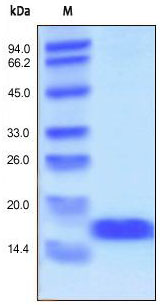Recombinant Human Cathepsin E/CTSE
| Product name: | Recombinant Human Cathepsin E/CTSE |
| Source: | Human Cells |
| Purity: | Greater than 95% as determined by reducing SDS-PAGE. |
| Buffer Formulation: | Lyophilized from a 0.2 μm filtered solution of 20mM MES, 150mM NaCl, pH 5.5. |
| Applications: | Applications:SDS-PAGE; WB; ELISA; IP. |
| Storage: | Avoid repeated freeze/thaw cycles. Store at 2-8 oC for one month. Aliquot and store at -80 oC for 12 months. |
| UOM: | 100ug/50ug/200ug/1mg/1g |
| Source | Human Cells |
| Description | Recombinant Human Cathepsin E is produced by our Mammalian expression system and the target gene encoding Ser20-Pro396 is expressed with a 6His tag at the C-terminus. |
| Names | Cathepsin E, CTSE |
| Accession # | P14091 |
| Formulation | Lyophilized from a 0.2 μm filtered solution of 20mM MES, 150mM NaCl, pH 5.5. |
| Shipping |
The product is shipped at ambient temperature. |
| Reconstitution |
Always centrifuge tubes before opening. Do not mix by vortex or pipetting. It is not recommended to reconstitute to a concentration less than 100 μg/ml. Dissolve the lyophilized protein in ddH2O. Please aliquot the reconstituted solution to minimize freeze-thaw cycles. |
| Storage |
Lyophilized protein should be stored at < -20°C, though stable at room temperature for 3 weeks. Reconstituted protein solution can be stored at 4-7°C for 2-7 days. Aliquots of reconstituted samples are stable at < -20°C for 3 months. |
| Biological Activity |
Specific Activity is greater than 350pmol/min/ug |
| Purity |
Greater than 95% as determined by reducing SDS-PAGE. |
| Endotoxin | Less than 0.1 ng/µg (1 IEU/µg) as determined by LAL test. |
| Amino Acid Sequence |
SLHRVPLRRHPSLKKKLRARSQLSEFWKSHNLDMIQFTESCSMDQSAKEPLINYLDMEYFGTISI GSPPQNFTVIFDTGSSNLWVPSVYCTSPACKTHSRFQPSQSSTYSQPGQSFSIQYGTGSLSGIIG ADQVSVEGLTVVGQQFGESVTEPGQTFVDAEFDGILGLGYPSLAVGGVTPVFDNMMAQNLVDLPM FSVYMSSNPEGGAGSELIFGGYDHSHFSGSLNWVPVTKQAYWQIALDNIQVGGTVMFCSEGCQAI VDTGTSLITGPSDKIKQLQNAIGAAPVDGEYAVECANLNVMPDVTFTINGVPYTLSPTAYTLLDF VDGMQFCSSGFQGLDIHPPAGPLWILGDVFIRQFYSVFDRGNNRVGLAPAVPVDHHHHHH
|
| Background | Cathepsin E (CTSE) is a gastric aspartyl protease that functions as a disulfide-linked homodimer. It is a member of the Peptidase C1 family, and has a specificity similar to that of Pepsin A and Cathepsin D. CTSE is localized to the endoplasmic reticulum and Golgi apparatus, while the mature enzyme is localized to the endosome. It is expressed abundantly in the stomach, the Clara cells of the lung and activated B-lymphocytes, and at lower levels in lymph nodes, skin and spleen. CTSE is an intracellular proteinase that have a role in immune function, activation-induced lymphocyte depletion in the thymus, neuronal degeneration and glial cell activation in the brain. Futhermore, it probably involved in the processing of antigenic peptides during MHC class II-mediated antigen presentation. |














